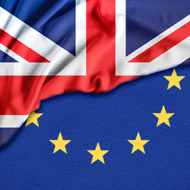BVA reacts to Brexit white paper

The paper specifies that being outside of the common agricultural policy will allow the UK to implement higher animal welfare standards.
BVA president John Fishwick has responded to the government’s Brexit white paper on the future relationship between Britain and the European Union.
The paper covers agricultural, food and fisheries products and specifies that being outside of the common agricultural policy (CAP) will allow the UK to implement higher animal welfare standards. It also reaffirms the future partnership will endeavour to recognise the qualifications held by professionals, including vets.
Responding, Mr Fishwick said: “We’re pleased to see that the government is committed to seeking out opportunities to build on the UK’s existing high animal welfare standards post-Brexit. Veterinary involvement is key to upholding these standards and placing the UK on a firm footing in trade negotiations.
“While Brexit will of course bring challenges, it also presents significant opportunities to enhance and prioritise animal welfare in areas including transportation, live exports and food labelling. However, there are areas that will continue to require a proactive and joined-up international approach, such as disease surveillance and working together to tackle the threat of antimicrobial resistance.”
The government is also putting forward the notion of a common rulebook to reassure the UK and the EU that agri-food products in circulation meet the necessary requirements. This would remove the need to undertake additional regulatory checks at the border - avoiding the need for veterinary inspections between Northern Ireland and Ireland and other UK borders.
Mr Fishwick continued: “It’s positive to see that the government is recognising Northern Ireland and Ireland as a single epidemiological unit and supports the continuation of the All Ireland Animal Health and Welfare Strategy. The latter is a great example of what can be achieved through working together and securing buy-in from industry to enhance animal health and welfare in both countries.
“BVA also welcomes the commitment to maintaining the spirit of the mutual recognition of professional qualifications and looks forward to engaging with the government on this important issue. The veterinary workforce is already experiencing shortages and recruitment challenges in some areas, so it’s critical to ensure that the qualifications of EU vets working in the UK continue to be valid post-Brexit to guard against a serious and sudden shortfall in capacity.
“Finally, we are pleased to see that the government is setting out sensible and proportionate proposals to address concerns raised by BVA that veterinary checks at the border would cause delays for exporters and require a huge increase in the workforce to meet this demand.”



 The Veterinary Medicines Directorate (VMD) is inviting applications from veterinary students to attend a one-week extramural studies (EMS) placement in July 2026.
The Veterinary Medicines Directorate (VMD) is inviting applications from veterinary students to attend a one-week extramural studies (EMS) placement in July 2026.